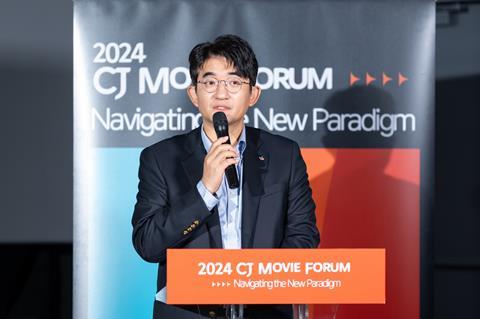
South Korea’s leading entertainment company CJ ENM has revealed plans to support the challenged K-content ecosystem by maintaining its annual content investment of $750m (KRW1tn) and extending its IP across platforms.
At a dedicated forum during Busan International Film Festival (BIFF) today (October 4), leading executives from the firm shared their ambition to lead the K-content industry. Yoon Sang-hyun, CEO of CJ ENM, said: “Despite the growing uncertainty in the film industry, we will continue to support creators and enable their imaginations to come to life and shine bright.”
Executives from CJ’s entertainment division subsidiaries CJ CGV, Studio Dragon, and TVING also joined the forum, proposing ideas for development amid a rapidly transforming environment.
The four companies presented strategies they envision that included building a progressive production system by securing talented and aspiring creators, strengthening competitiveness by creating synergy between linear and digital platforms and solidifying a proactive distribution system, and establishing a sustainable global business structure.
Yoon acknowledged that “the content industry is in the middle of significant changes” due to factors such as increasing production costs and a shift to short-form content, but that he continued to “believe in the power of K-content”.
He added that while CJ is “taking each step with more care and thought than ever before,” it is not “shying away from the vision of becoming a global storytelling powerhouse.”
A session titled How to Revive the Content Industry featured CJ ENM head of content distribution business Seo Hang-ho, CJ CGV chief of business innovation office Lee Dong-hyun, TVING CEO Choi Ju-hui and Studio Dragon CEO Jang Kyung-ik.
Addressing challenges described as “the greatest ever seen” in the South Korean screen industry, Seo said they included production costs for scripted content, which have doubled since the pandemic, and the continued decline of ad revenue from linear networks. “A quick solution seems unlikely,” added the CJ ENM executive, noting that many of his counterparts in Europe are facing similar issues.
“If we think of 2019, the peak year for films, as 100, we’re now at about 60,” said Lee, adding that while he has seen a slow recovery since 2022, that recovery is uneven. There have been major hits such as The Roundup: Punishment this year, but mid-tier films have declined. “I have serious concerns about the future of the [film] market, including next year,” said Lee. “With no clear opportunity or momentum to turn things around, our ‘new normal’ could stabilise.”
Jang, the newly appointed CEO of TV drama series producer Studio Dragon, said that when he joined three months ago, the words on everyone’s lips were “crisis” and “cuts,” referring to the need to reduce production costs.
But Jang emphasised that the solution is not across-the-board cuts, as some productions will continue to require larger budgets to break through. Instead, Jang said, the goal is budget optimisation, including bringing in more in-house experts on budgeting. Cuts, however, “aren’t the answer to everything,” said Jang. “We have to have a new business model” and “well-made premium content so the audience will keep coming back to us”.
Global expansion
The speakers also emphasised that because it is increasingly hard to break even domestically, global expansion is essential. Seo discussed efforts to break into markets in which Korean content is not yet popular or profitable, such as India, which he visited earlier this year for discussions. Seo mentioned that such expansion efforts will require greater investment in foreign-language dubbing, which he intends to discuss with the government’s Korea Creative Content Agency (KOCCA).
A further topic of conversation was the synergy between platforms such as cinemas, linear TV and streaming. Lee made the case for cinemas as offering an “offline space with the unique advantage of gathering fans in person,” and mentioned a recent screening event of the finale of series Lovely Runner.
The screenings, featuring live appearances by cast members, were “a huge success that sold out immediately,” said Lee, who added that 20% of those who attended had come to a cinema for the first time in a long time. TVING CEO Choi added that the platform, which recently signed a deal with the Korean Baseball Organization to stream games, may use cinemas to hold live events for baseball fans.
The forum’s first session featured a range of statistics from Cho Jin-ho, head of domestic business division, CJ CGV. Among Cho’s findings were the fact that the correlation between cinema ticket sales and seasonal events like school holidays has weakened, signalling cinemagoers are now more motivated by the quality of films than seasonality.
Cho also pointed toward three categories of film that have shown strong sales: animation, arthouse and genre, including horror and comedy. Animation, which has been led by recent strong titles such as Japan’s The First Slam Dunk and Disney-Pixar’s Inside Out 2, has benefitted from an increase in adult viewership, while arthouse (with strong titles including Pretty Things and Perfect Days) is attracting more viewers in their teens and 20s who spend a lot of time and energy on their habits, or so-called deokhu consumers.















![[L-R]: Amanda Villavieja, Laia Casanovas, Yasmina Praderas](https://d1nslcd7m2225b.cloudfront.net/Pictures/274x183/6/4/1/1471641_pxl_20251224_103354743_618426_crop.jpg)









No comments yet